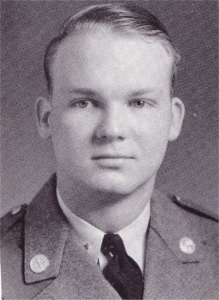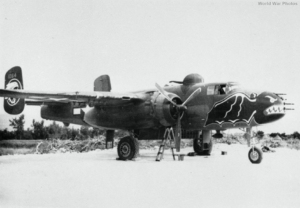Scroll of Honor – James Crisp Akers Salter
Stormy Weather
Written by: Kelly Durham
When we think about airplane pilots and stormy weather, we often picture disaster in the skies. James Crisp Akers Salter  suffered the effects of stormy weather on terra firma.
suffered the effects of stormy weather on terra firma.
Jimmy Salter came to Clemson from Atlanta, Georgia and majored in civil engineering. As an upper classman, he was a member of the American Society of Civil Engineers and he also completed ROTC training held at Clemson in the summer of 1941. That training led to his commissioning as an Army second lieutenant upon graduation in the spring of 1942.
Salter applied for service in the Army Air Force and was accepted into flight training. After earning his pilot’s wings and qualifying to command the B-25 Mitchell medium bomber, Salter joined the 499th Bombardment Squadron , the “Bats Outta Hell,” which had been formed in Columbia. Originally designated for the European Theater, the 499th was diverted to Australia after the successful use of medium bombers in the Battle of the Bismarck Sea. In early June 1943, the 499th reached its combat station near Port Moresby, New Guinea. Over the next two years, Salter flew fifty-seven combat missions, mostly bombing and strafing of Japanese installations on New Guinea and the Bismarck Archipelago.

A 499th Bombardment Squadron B-25 with distinctive “Bat Outta Hell” nose art.
The 499th flew missions against the Japanese Navy base at Rabaul earning a Distinguished Unit Citation. The squadron earned a second such citation for its attacks on the Admiralty Islands. In July 1944, the squadron moved to a new base on Biak Island in the Dutch East Indies from which it supported General MacArthur’s Southwest Pacific Campaign. In November, Salter and the 499th moved once again, this time to a base in the Philippines from which it could support Allied operations throughout that island chain and launch attacks as far north as Formosa.
After earning an Air Medal with two oak leaf clusters and three campaign stars, flight leader Salter was finally sent back to the United States in the summer of 1945. The Japanese had been beaten back to their home islands, but the Army was still training bomber pilots and crews for the anticipated invasion of Japan planned to begin that November. Salter was assigned to Williams Army Airfield, about thirty miles south of Phoenix, Arizona, a key training base for multi-engine pilots.
On August 2, Captain Salter was killed when the car in which he was a passenger struck a tree which had been uprooted and flung into the road by a tornado. He was survived by his mother, grandmother, three uncles, and an aunt.
For more information about James Crisp Akers Salter see:
https://soh.alumni.clemson.edu/scroll/james-crisp-akers-salter/
For additional information about Clemson University’s Scroll of Honor visit:
https://soh.alumni.clemson.edu/
